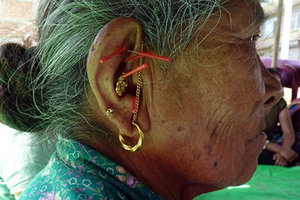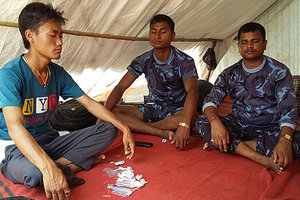With almost 9,000 people killed during the earthquakes in April and May, another 23,000 suffering injuries, hundreds of thousands left homeless when entire villages collapsed, and many sacred sites destroyed, no one in this country of approximately 28 million has been left untouched by the disaster. Everyone has lost something or someone. Everyone is a survivor.
Destruction from the earthquakes means extreme distress for a people already struggling with poverty, governmental corruption, civil war, and high rates of human trafficking. The hardship is not only physical, but deep mental and emotional pain that will last for decades to come. While disaster relief organizations provide food, water, temporary housing, and medical care, there is comparatively little assistance for the mental health needs of survivors. And yet what remains after survival needs are met is post-traumatic stress that prevents true recovery, a condition which often extends into the next generation. Acupuncture is one of the few tools being used to address this challenge in Nepal, and the results are profoundly effective.
"You (AWB) are on target about the collective stress level of the Nepali people ...life here is shaken to the core...Responding to the trauma left in the wake of recent earthquakes, with more inevitably on the way due to imminent Monsoon-related tragedies, is front and center among priorities ...after seeing this work there is no question as to the efficacy of this treatment," said Bill Wulsin, an AWB volunteer who also worked with AWB in New Orleans after Katrina and in Haiti.
 "Whenever a disaster strikes and its devastation is such an extreme magnitude and far reaching catastrophe in its effects, the simple act of placing 5 needles in each ear is profound in its ability to heal and nurture. The fact that I can do something, anything that can ease the pain and suffering of so many touches me deeply and makes me extremely grateful to be of service in this way. I will strive to make this possible to as many people as I can," said long time AWB volunteer Linda Umla.
"Whenever a disaster strikes and its devastation is such an extreme magnitude and far reaching catastrophe in its effects, the simple act of placing 5 needles in each ear is profound in its ability to heal and nurture. The fact that I can do something, anything that can ease the pain and suffering of so many touches me deeply and makes me extremely grateful to be of service in this way. I will strive to make this possible to as many people as I can," said long time AWB volunteer Linda Umla.
Empowering Communities
AWB has worked in Nepal since 2009, training more than 70 Nepali health workers to provide trauma-healing acupuncture treatments in rural health camps, women's organizations, community groups that rescue young people from trafficking for sex, organs and labor, and peace organizations working to resolve the traumatic legacy of civil war. When the earthquakes hit, AWB Nepal acupuncturists went into immediate action. Since April, almost 10,000 NADA (National Acupuncture Detoxification Association) protocol ear acupuncture treatments have been delivered in 50 mobile community clinics in eight districts most impacted by the quakes. Additionally, full body treatments have been done in some locations.
A pivotal part of AWB's mission is the empowerment of local health workers to provide trauma healing services in their own communities in a sustainable way. With significant support from the Community Development Institute, AWB began to build a program in Nepal, providing training and practitioner stipends for on-going trauma healing work. At the time of the earthquakes, a service infrastructure was already in place to respond to the acute needs of thousands of displaced residents, elders, young people in youth camps, first responders, medical personnel, members of the Nepal Police, Nepal Army, and religious refugee communities. We have now seen how powerful capacity building can be in a disaster when the foundation has already been built locally. The impact of this is seen not only in the thousands of people treated, but in the effect on Nepalis doing this work, and the changes it brings to their lives and to the whole community.
Volunteers From Around The World
The AWB Nepal Earthquake Relief Project has been a global collaboration of the best kind, led by the AWB Nepal Team with the support of AWB in the United States. This team, incredible as it is, has also suffered from exhaustion, stress, and trauma in the wake of the earthquake, working around the clock, sometimes providing up to 600 treatments a day.
 After the first month of tireless service, AWB Nepal asked for assistance from volunteer practitioners outside the country. With coordination and administrative support from AWB in the U.S., more than a dozen experienced volunteers from the U.S. and other nations traveled to Nepal between May and August to bring reinforcement, supplies, perspective, and clinical support to the Nepali team. At significant personal expense, their service has changed the lives of thousands of people.
After the first month of tireless service, AWB Nepal asked for assistance from volunteer practitioners outside the country. With coordination and administrative support from AWB in the U.S., more than a dozen experienced volunteers from the U.S. and other nations traveled to Nepal between May and August to bring reinforcement, supplies, perspective, and clinical support to the Nepali team. At significant personal expense, their service has changed the lives of thousands of people.
Most AWB volunteers received field training before traveling to Nepal by attending AWB's Level I Healing Community Trauma training course, Level 2 advanced international disaster relief training, or World Healing Exchange program – or by training with the National Acupuncture Detoxification Association (NADA). In addition to the amazing work of the Nepali Team and overseas volunteers, financial support from many individuals, the Community Development Institute, and corporations/institutions like Mayway, Lhasa OMS, Carbo Medical Supplies, Acurea Medical, Golden Flower Herbs, China Herb Company, Emperors College, Bastyr University and Blue Poppy Press, has made the relief effort possible.
"As I connected with many Nepalis I learned that their houses can look unaffected by the earthquakes from the outside, but inside the cracks were so severe that the owners felt unsafe to spend the night in them. This seemed the metaphor: the Nepali people were naturally graceful and smiling on the outside, but inside they were broken, cracked. And it will take a long time, years until this county has healed. I'm aware that our treatment didn't mend these cracks, but our work might have given them the spark to begin mending/tending the cracks. At least the spark in their eyes after the treatments indicated that. One of the most touching experience for me was to Namaste with one of the hundred patients we treated at the Leprosy Colony near Kathmandu. We both put our hands together, him missing all his fingers. Recognition, gratitude and healing clearly went both ways," said volunteer Ursula Popp.
Since the impact of the 2015 earthquakes in Nepal will be long lasting, affecting generations to come, the need for ongoing disaster relief and trauma healing will also last for years. AWB will continue working in Nepal to meet this need by training Nepali health workers, providing stipend support for local acupuncturists and health care workers, and building capacity in the mainstream health care system so that more people can receive trauma healing treatment. You can support trauma healing work in Nepal by going to www.acwb.info to make a donation. Updates on the AWB Nepal Earthquake Relief Project can be found at www.facebook.com/acuwithoutborders.
Acupuncturists Without Borders is a non-profit organization devoted to bringing trauma healing to communities affected by natural disaster and human conflict. Carla Cassler and Melanie Rubin are the Co-Directors of Acupuncturists Without Borders. Diana Fried founded AWB and is director of the AWB Nepal Program.
Carla Cassler, DAOM, LAc, is associate director AWB. She has practiced acupuncture and Chinese medicine for over 30 years, specializing in women’s health, pediatric, orthopedic and treatment for traumatic stress. Her interest in trauma treatment began in l992 when she practiced acupuncture on Kibbutz Gan Shmuel, where many of her patients suffered from physical and mental health problems experienced during multiple wars and the Holocaust. In 2010 she co-founded the Bay Area Veteran’s Acupuncture Clinic (BAYVAC) which provides free weekly acupuncture treatment to veterans, military personnel and their families for pain and post-traumatic stress. She splits her time between a clinical private practice in Kensington, CA and her work with AWB where she coordinates trauma healing programs in Greece, Israel and the West Bank.
Diana Fried launched Acupuncturists Without Borders in 2005, and has worked in disaster areas and underserved communities doing community acupuncture healing in Louisiana, Haiti, Nepal, Mongolia, Ecuador, Mexico and other locations in the U.S. and around the world. Diana developed AWB's Healing Community Trauma training program, which provided training for over 6,000 acupuncturists in the U.S., and hundreds in other countries, on how to do mobile community service field work with acupuncture. She graduated from the Academy for Five Element Acupuncture and is also a certified acupuncture detoxification specialist (NADA), and a certified qigong instructor.
Melanie Rubin, MEd, is a NADA Acupuncture Detoxification Specialist and Co-Director of Acupuncturists Without Borders. Melanie has been a trainer for more than 25 years, delivering programs for health professionals in hospitals, acupuncture schools and bodywork programs. Melanie has worked with AWB since 2009 providing support for redeveloping the national training program, training delivery nationally and internationally, systems administration, marketing, the Haiti program, and other special programs.



